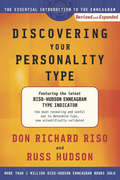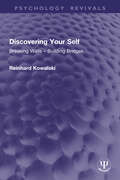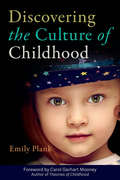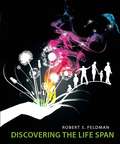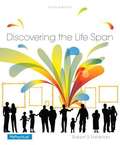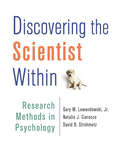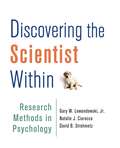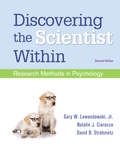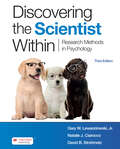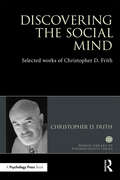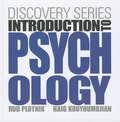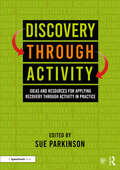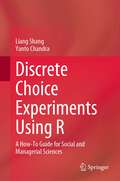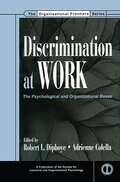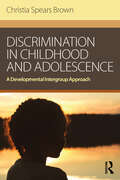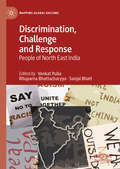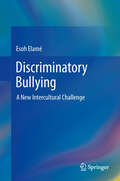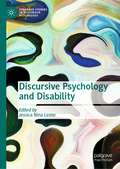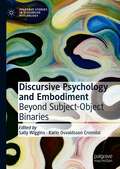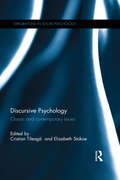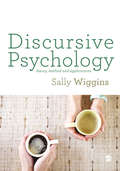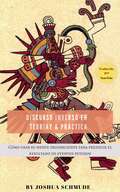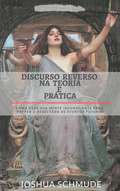- Table View
- List View
Discovering Your Personality Type: The Essential Introduction to the Enneagram
by Don Richard Riso Russ HudsonThe bestselling beginner&’s guide to identifying and understanding the nine personality profiles and applying them to your daily life.The leading experts in the field, Don Richard Riso and Russ Hudson have set the standard for determining personality type using the enneagram. Their studies of this ancient symbol and their progress in determining type with increasing accuracy are known, taught, and emulated worldwide.Discovering Your Personality Type is the essential introduction to this system, a psychological framework that can be used practically, in many aspects of daily life. This revised and updated edition features the all-new, scientifically validated Riso-Hudson Type Indicator, and has also been refined and simplified to appeal especially to beginners and anyone interested in unlocking the secrets of personality. The most reliable, most accurate, and most accessible way to identify type, the improved enneagram questionnaire helps identify fundamental character traits, revealing invaluable directions for change and growth. The profile that emerges is useful for a wide variety of purposes: professional development, education, relationships, vocational counseling, and more. Discovering Your Personality Type is the book readers need in order to begin to see the possibilities made available by understanding personality types.More Than 1 Million Riso-Hudson Enneagram Books Sold
Discovering Your Self: Breaking Walls – Building Bridges (Psychology Revivals)
by Reinhard KowalskiOriginally published in 1993, Discovering Your Self is a remarkable and original personal account which examines the psychological walls we build around us. In it, Reinhard Kowalski, a consultant clinical psychologist and psychotherapist, develops his model of psychotherapy and psychosynthesis in a personal, psychological, clinical and political way. The result is a psychological guide-book through an increasingly complex, changing and confusing inner and outer world.His exploration draws on re-formulated cognitive behaviour therapy, stress management, and psychosynthesis psychotherapy, as well as Leontyev’s activity theory, and the works of Grof, Wilber and Masterson. In addition, Douthwaite’s economic considerations and the process of German unification, with its symbolism of the ‘Wall coming down’, are discussed in a psychotherapeutic way. The discovery of ‘Self’ is seen as a process that needs to constantly to deal with ‘breaking walls and building bridges’ between the different aspects and levels of our being.Throughout the book there are experiential exercises and meditations, based in psychosynthesis, that are relevant for therapists and for individuals who are on their own journey of personal growth. The book aims at sharing with the reader ways and means of becoming conscious of our own inner ‘greenhouse’, the closed system within, and of breaking through the walls that we have built within us, around us, and between each other.The result is fascinating book that challenges our widely accepted views of ourselves in a practical and experiential way.
Discovering the Culture of Childhood
by Carol Garhart Mooney Emily PlankView the culture of childhood through a whole new lens. Identify age-based bias and expand your outlook on and understanding of early childhood as a culture. Examine various elements of childhood culture: language, belief economics, arts, and social structure to understand children's dispositions of questioning, engagement, and cooperation.Emily Plank specializes in play-based education, diversity and culture in early childhood education, and outdoor learning. In 2011, the Iowa Association for the Education of Young Children identified Emily as one of seven emerging leaders. She earned her bachelor's degree from Pepperdine University. She and her family currently reside in Lausanne, Switzerland.
Discovering the Life Span
by Robert S. FeldmanModular, manageable, meaningful--help your students discover the life span! Based on extensive market research, and informed by author Robert Feldman's own teaching experience, Discovering the Life Span was created to meet key teaching needs. Many instructors would like to cover the entire life span in a single term. They would like their students to see the big picture and understand how the domains of development work together. And, perhaps most importantly, they would like their students to truly connect to the material. This remarkable first edition does all three of these things. Here's how: Structured around a modular format, each stage of life and each domain are treated equally throughout the text. This balanced format offers instructors teaching flexibility while helping students see the connections between the physical, cognitive, and social/personality domains.
Discovering the Life Span
by Robert S. FeldmanDiscovering the Life Span, 3/e by Robert S. Feldman helps students truly connect to the material. Written in an engaging and accessible style and organized in a modular format, this title allows instructors to cover the entire lifespan without having to sacrifice content throughout their course. Students will get a better sense of the entire process of development and understand how the domains of development work together. Discovering the Life Span is a meaningful learning experience that prepares readers to apply content to their personal and future professional lives.
Discovering the Scientist Within
by Jr. Gary W. Lewandowski Natalie J. Ciarocco David B. StrohmetzIn this breakthrough first edition, authors Gary Lewandowski, Natalie Ciarocco, and David Strohmetz draw on their extensive classroom experiences to introduce research methodology in a highly effective, thoroughly engaging new way, maximizing students' familiarity with every step of the process. For the first time in a methods text, each design chapter follows a single study from ideation to writing for publication, with students researching an intriguing question emerging from a chapter-long case study. Also for the first time in a methods text, each design chapter models the entire research process, so students get multiple opportunities to experience that process start to finish.
Discovering the Scientist Within Research Methods in Psychology
by Gary W. Lewandowski Natalie J. Ciarocco David B. StrohmetzIn this breakthrough first edition, authors Gary Lewandowski, Natalie Ciarocco, and David Strohmetz draw on their extensive classroom experiences to introduce research methodology in a highly effective, thoroughly engaging new way, maximizing students’ familiarity with every step of the process. For the first time in a methods text, each design chapter follows a single study from ideation to writing for publication, with students researching an intriguing question emerging from a chapter-long case study. Also for the first time in a methods text, each design chapter models the entire research process, so students get multiple opportunities to experience that process start to finish.
Discovering the Scientist Within: Research Methods In Psychology
by Jr. Gary Lewandowski Natalie Ciarocco David StrohmetzDiscovering the Scientist Within
Discovering the Scientist Within: Research Methods in Psychology
by Natalie J. Ciarocco Gary W. Lewandowski, Jr. David B StrohmetzEverything you’ll ever need to know about research methods, with each chapter centered around a fun example of a particular type of research.
Discovering the Social Mind: Selected works of Christopher D. Frith (World Library of Psychologists)
by Christopher D. FrithIn the World Library of Psychologists series, international experts themselves present career-long collections of what they judge to be their finest pieces - extracts from books, key articles, salient research findings, and their major practical theoretical contributions. Christopher D. Frith has an international reputation as an eminent scholar and pioneer in the fields of schizophrenia, consciousness, and social cognition. A specially written introduction gives an overview of his career and contextualises the selection in relation to changes in the field during this time. This collection reflects the various directions of Frith’s work, which has become increasingly philosophically oriented throughout his career, and enables the reader to trace major developments in these areas over the last forty years. Frith has had his work nominated for the Royal Society Science Book Award and, in 2009, was awarded the Fyssen Foundation Prize for his work on neuropsychology. He has also been awarded several prestigious prizes for his collaborative work with Uta Frith. This book is an essential read for those students and researchers engaged in the fields of social cognition, cognitive psychology and consciousness studies.
Discovering the Social Mind: Selected works of Christopher D. Frith (World Library of Psychologists)
by Christopher D. FrithIn the World Library of Psychologists series, international experts themselves present career-long collections of what they judge to be their finest pieces - extracts from books, key articles, salient research findings, and their major practical theoretical contributions.Christopher D. Frith has an international reputation as an eminent scholar and pioneer in the fields of schizophrenia, consciousness, and social cognition. A specially written introduction gives an overview of his career and contextualises the selection in relation to changes in the field during this time.This collection reflects the various directions of Frith’s work, which has become increasingly philosophically oriented throughout his career, and enables the reader to trace major developments in these areas over the last forty years. Frith has had his work nominated for the Royal Society Science Book Award and, in 2009, was awarded the Fyssen Foundation Prize for his work on neuropsychology. He has also been awarded several prestigious prizes for his collaborative work with Uta Frith.This book is an essential read for those students and researchers engaged in the fields of social cognition, cognitive psychology and consciousness studies.
Discovery Series: Introduction to Psychology
by Rod Plotnik Haig KouyoumdjianThe Cengage Learning DISCOVERY SERIES: INTRODUCTION TO PSYCHOLOGY is designed to deliver traditional course content in an innovative "hybrid" learning format--instruction presented in a printed book paired with integrated online applications and assessments. The program promotes measurable mastery of core course learning objectives by guiding students' active engagement with content delivered through the book, images, video, simulations, and assessments. This contemporary approach to learning seamlessly integrates text and technology, enabling students to easily move from the book's instruction to its online applications for a deeper, lasting understanding of the core psychological concepts, and for assessments that reliably track students' progress and performance.
Discovery Through Activity: Ideas and Resources for Applying Recovery Through Activity in Practice
by Sue ParkinsonDiscovery Through Activity provides a compendium of ideas, resources and practice evaluations that will inspire practitioners to be even more imaginative and to customise their own Recovery Through Activity programmes to meet the specifi c needs of participants. The original Recovery Through Activity handbook offers a flexible programme that is widely used in adult mental health settings. This accompanying and complementary resource shows how the intervention has been extended, adapted and applied service-wide. The resource showcases the work of a growing community of practitioners who have successfully facilitated Recovery Through Activity programmes to provide a forum for people to refl ect on their occupational lives and discuss and practise lifestyle choices that will enable them to improve their health and wellbeing. It includes: • an extended range of flexible ideas and resources to meet the needs of participants in Recovery Through Activity sessions • examples of how to apply Recovery Through Activity in one- to- one sessions and virtual groups • encouragement to adopt Recovery Through Activity across your services with confidence. With contributions illustrating the effective application of Recovery Through Activity in a range of settings and situations, this is a valuable resource for occupational therapists and other practitioners in mental health settings.
Discrete Choice Experiments Using R: A How-To Guide for Social and Managerial Sciences
by Yanto Chandra Liang ShangThis book delivers a user guide reference for researchers seeking to build their capabilities in conducting discrete choice experiment (DCE). The book is born out of the observation of the growing popularity – but lack of understanding – of the techniques to investigate preferences. It acknowledges that these broader decision-making processes are often difficult, or sometimes, impossible to study using conventional methods. While DCE is more mature in certain fields, it is relatively new in disciplines within social and managerial sciences. This text addresses these gaps as the first ‘how-to’ handbook that discusses the design and application of DCE methodology using R for social and managerial science research. Whereas existing books on DCE are either research monographs or largely focused on technical aspects, this book offers a step-by-step application of DCE in R, underpinned by a theoretical discussion on the strengths and weaknesses of the DCE approach, with supporting examples of best practices. Relevant to a broad spectrum of emerging and established researchers who are interested in experimental research techniques, particularly those that pertain to the measurements of preferences and decision-making, it is also useful to policymakers, government officials, and NGOs working in social scientific spaces.
Discrimination at Work: The Psychological and Organizational Bases (SIOP Organizational Frontiers Series)
by Adrienne Colella Robert L. DipboyeThis volume brings together top scholars in industrial and organizational psychology with social psychologists to explore the research and theory relating to various areas of workplace discrimination. Many of the contributors to this book participated in a conference on workplace discrimination held at Rice University in May 2000. The idea came from the realization that there had been no attempt to bring together the various literatures on the topic. Discrimination and issues of employment diversity are significant topics today in IO psychology, business, and human resource management. This edited volume examines the following components of this important discussion: how to explain discrimination in organizations; understanding discrimination against specific groups; and implications for practical efforts to reduce discrimination. This book brings together, in one volume, a review of the research on discrimination based on race, age, sexual orientation, gender, physical appearance, disability, and personality. In addition, it explores the multilevel antecedents and potential bases for a general model of discrimination in the workplace. While social psychological research and theory have provided invaluable insights, an understanding of discrimination in the workplace and solutions will require incorporating factors at the organizational level in addition to factors at the individual and group levels. Although a definitive model is not reached, the aim of this text is to facilitate future research and theory.
Discrimination in Childhood and Adolescence: A Developmental Intergroup Approach
by Christia Spears BrownDiscrimination impacts most youth at some point. Almost all children and adolescents belong to at least one stigmatized group, whether they are a Black or Latino boy in school; an immigrant or refugee; a gay, lesbian, or bisexual teen; or a girl in physics class. Discrimination on the basis of race/ethnicity, immigration status, gender, sexual orientation, and gender identity can have long-term academic, psychological, and social repercussions, especially when it is directed at a cognitively developing child or an emotionally vulnerable adolescent. How children and adolescents are impacted by this discrimination depends on their cognitive ability to perceive the bias, the context in which the bias occurs, and resources they have to help cope with the bias. This book details, synthesizes, and analyzes the perception and impact of discrimination in childhood and adolescence across multiple stigmatized social groups to help us better understand the complex phenomenon of discrimination and its long-term consequences. By looking at the similarities and differences in discrimination across all social groups, we can more fully understand its mechanisms of influence. Before we can fully address the persistent achievement gap between White and ethnic minority children, the high rates of suicidal thoughts among LGBT youth, and the underrepresentation of girls in STEM careers, we must first examine the ways in which discrimination influences and is understood by children, with their unique cognitive constraints and within the specific contexts in which they live.
Discrimination, Challenge and Response: People of North East India (Mapping Global Racisms)
by Venkat Pulla Rituparna Bhattacharyya Sanjai BhattThis book explores discrimination against Northeast Indians, who have been frequently stereotyped as backwards, anti-national, anti-assimilationist, immoral, and relegated to low paying positions across retail, hospitality, telecommunications and wellness industries. The contributions draw on interviews with individuals who have migrated to other Indian cities and towns to find jobs and escape from native poverty, and provide a critical examination of the intersections between power, privilege and racial hierarchy in India today. The chapters cover a variety of perspectives including social movements and activism, history, policy, youth studies and gender studies. With a focus on marginalised communities, and the effects and persistence of racial inequality in a South Asian context, this collection will be an important contribution to critical race studies, public policy, human rights discourse, and social work.
Discriminatory Bullying: A New Intercultural Challenge
by Esoh ElaméThis book is devoted to the relation between bullying at school and ethnicity, gender, sexual orientation, and disability. In examining the interactions between bullying and discrimination, the authors set out from the premise that the current practice of intercultural education does not systematically address the issue of bullying, as evidenced by the lack, within schools, of intercultural education projects. The starting point for the work is a survey conducted in ten European countries on a sample of about 9,000 students including immigrants and natives. The research provides important information on which factors deserve special attention when formulating interventions in the classroom with the aim of preventing or combating discriminatory bullying. If intercultural education is called upon to handle the fight against any form of discrimination, it cannot shirk from addressing the issue of bullying discrimination. The results represent a sound, stimulating basis for broad and realistic reflections on discriminatory bullying and intercultural education, and show that intercultural pedagogy needs to be appropriately equipped theoretically. This book will be an indispensable tool for those seeking a thorough understanding of the new challenges facing intercultural education and the means of overcoming them. On that basis, innovative education practices should be developed with the aim of spreading a culture of non-violence and intercultural dialogue.
Discursive Psychology and Disability (Palgrave Studies in Discursive Psychology)
by Jessica Nina LesterThis book explores how discursive psychology (DP) research can be applied to disability and the everyday and institutional constructions of bodymind differences. Bringing together both theoretical and empirical work, it illustrates how DP might be leveraged to make visible nuanced understandings of disability and difference writ large. The authors argue that DP can attend to how such realities are made relevant, dealt with, and negotiated within social practices in the study of disability. They contend that DP can be used to unearth the nuanced and frequently taken for granted ways in which disability is made real in both everyday and institutional talk, and can highlight the very ways in which differences are embodied in social practices – specifically at the level of talk and text. This book demonstrates that rather than simply staying at the level of theory, DP scholars can make visible the actual means by which disabilities and differences more broadly are made real, resisted, contested, and negotiated in everyday social actions. This book aims to expand conceptions of disability and to deepen the – at present, primarily theoretical – critiques of medicalization.
Discursive Psychology and Embodiment: Beyond Subject-Object Binaries (Palgrave Studies in Discursive Psychology)
by Sally Wiggins Karin Osvaldsson CromdalFor over thirty years, discursive psychology has offered a robust challenge to cognitivist approaches to psychology, demonstrating the relevance of discursive practices for understanding psychological topics and social interaction. Matters of embodiment – the visceral, sensory, physical aspects of psychology – have, however, so far received much less attention. This book is the first text to address the theoretical and analytical challenges raised by bodies in interaction for discursive psychology. The book brings together international experts, each of which tackles a different topic area and interactional setting to examine embodiment as a social object. The authors consider the issue of subject-object relations and how ‘inner’ psychological subject-side states are constructed and enacted in relation to object-side states through embodied discursive practices. How do bodily processes become particular kinds of embodiment through and within social interaction? How are bodies psychologised as social objects? Moving beyond dualisms of the subject/object that construct an ‘inner’ and ‘outer’ psychological state, the book pushes forward contemporary theory and analysis within discursive psychology. Discursive Psychology and Embodiment is therefore an essential resource for researchers across the social sciences working within discourse, social interaction, and the ‘turn to the body’.
Discursive Psychology: Classic and contemporary issues (Explorations in Social Psychology)
by Cristian Tileagă Elizabeth StokoeDiscursive Psychology is the first collection to systematically and critically appraise the influence and development of its foundational studies, exploring central concepts in social psychology such as attitudes, gender, cognition, memory, prejudice, and ideology. The book explores how discursive psychology has accommodated and responded to assumptions contained in classic studies, discussing what can still be gained from a dialogue with these inquiries, and which epistemological and methodological debates are still running, or are worth reviving. International contributors look back at the original ideas in the classic papers, and consider the impact on and trajectory of subsequent work. Each chapter locates a foundational paper in its academic context, identifying the concerns that motivated the author and the particular perspective that informed their thinking. The contributors go on to identify the main empirical, theoretical or methodological contribution of the paper and its impact on consequent work in discursive psychology, including the contributors’ own work. Each chapter concludes with a critical consideration of how discursive psychology can continue to develop. This book is a timely contribution to the advance of discursive psychology by fostering critical perspectives upon its intellectual and empirical agenda. It will appeal to those working in the area of discursive psychology, discourse analysis and social interaction, including researchers, social psychologists and students.
Discursive Psychology: Theory, Method and Applications
by Dr Sally WigginsInstructors - Electronic inspection copies are available or contact your local sales representative for an inspection copy of the print version. Discursive Psychology is a theoretical and analytical approach used by academics and practitioners alike, widely applied, though often lost within the complicated web of discourse analysis. Sally Wiggins combines her expertise in discursive psychology with her clear and demystifying pedagogical approach to produce a book that is committed to student success. This textbook shows students how to put the methodology into practice in a way that is simple, engaging and practical.
Discursive Psychology: Theory, Method and Applications
by Sally WigginsDiscursive Psychology is a theoretical and analytical approach used by academics and practitioners alike, widely applied, though often lost within the complicated web of discourse analysis. Sally Wiggins combines her expertise in discursive psychology with her clear and demystifying pedagogical approach to produce a book that is committed to student success. This textbook shows students how to put the methodology into practice in a way that is simple, engaging and practical.
Discurso Inverso en Teoría y Práctica
by Joshua SchmudeDiscurso Inverso en Teoría y Práctica fue escrito en un periodo de 4 años y detalla cómo uno puede usar su mente inconsciente para predecir el resultado de las carreras de caballos, o cualquier otro lugar que desee. Escrito por Joshua Schmude, un estudiante de David John Oates y analista de habla inversa certificado, este libro lleva al lector en una búsqueda espiritual, descubriendo los poderes latentes que residen dentro de su propia alma.
Discurso Reverso na Teoria e Prática: Como usar a sua mente inconsciente para prever resultados futuros
by Joshua SchmudeNeste livro, o autor e terapeuta norte americano Joshua Schmude mergulha a fundo na Teoria do Discurso Reverso explorando o fenômeno precognitivo dessa tecnologia. Tendo Estudado e se formado como analista sob supervisão de David John Oates - o próprio criador da Teoria do Discuroso Reverso - Joshua Schmude utiliza a sua habilidade de escritor para passar ao leitor informações valiosas e sobre como usar de forma prática a teoria. Se você é uma pessoa de mente aberta e ama aprender sobre coisas novas e que podem mudar sua vida radicalmente de uma forma positiva, então não pense duas vezes em ler e reler este livro porque ele possui informações que você não encontrará em mais lugar algum!
